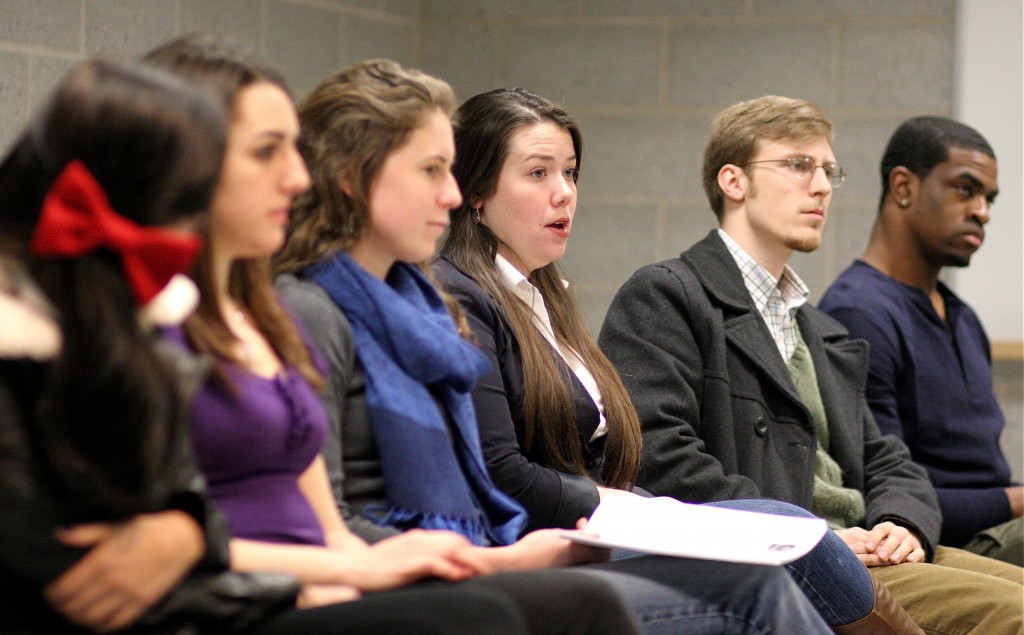The Binghamton University Student Association is seeking, once again, to become an independent, not-for-profit corporation.
Last year, the SA attempted to incorporate their organization — as well as rewrite the SA constitution to completely revamp the student government’s structure. The changes passed in a landslide vote by the SA Assembly in March 2011, but students voted them down in a referendum one month later.
SA President Kathryn Howard announced the organization’s intentions during a press conference on Wednesday. She said this year’s attempt at incorporation does not involve any constitutional changes and will not change how the SA operates.
“[The Executive Board] presented these changes all at once and the results with students was not too favorable,” Howard said, referring to last year’s political dogfight that ended with the landslide rejection of incorporation by the student body. “This year we are not making any other changes besides looking to file for non-profit incorporation status.”
The SA is legally viewed as an association, which, according to Howard, puts individual students at risk for potential lawsuits. If someone were hurt at an event, for example, he or she could take legal action against the student group hosting that event.
“Right now, every member could be held liable,” Howard said. “As an incorporated entity, it would just be the [SA] corporation held liable for that.”
Kate Flatley, SA vice president for academic affairs, said the SA is not looking to use the incorporation to function as a business or restructure the organization.
“We do want to protect our students,” Flatley said. “That’s our primary concern.”
Howard estimated that the process of filing for incorporation through New York state would take about two years. The process would involve creating a Student Association Inc., which would remain inactive until incorporation status was officially granted to it by the state.
Upon incorporation, the SA, as it exists today, would be dissolved in favor of the new corporation.
There could be a risk of a temporary loss of the SA’s tax-exempt status during the transition period, according to Howard.
“In order to file, we will have to get rid of our non-profit status for a short period of time,” she said. “If for some reason we lose tax-exempt status, this will happen over the summer vacation, and then we will get it back. This won’t affect student groups. They will get their tax exemptions.”
If the SA becomes a corporation, the legal names of its divisions will change. For example, the SA Executive Board will become the Board of Directors, and students will become shareholders. Howard said this will be only a technicality, however, and the names will remain the same in the SA’s constitution.
“When we fill out the paperwork with New York State, we will be indicating that the SA Constitution and Bylaws as they now stand will be the rules that the SA will follow,” Howard said.
To begin the process, the SA has been working with the University to finalize their intentions in writing. Howard said this is meant to ensure that regardless of future leadership changes within the SA, the organization as a whole will continue in the process of pursuing incorporation.
According to Howard, however, the incorporation paperwork will not be filed if students do not approve the idea. Although no referendum is technically needed for the SA to pursue this action, the E-Board will allow students to vote on incorporation on Feb. 28 at their residential community meetings.
“Now we’re just looking to talk to students,” Howard said. “There will be no change to the constitution so we don’t need a referendum for this, but we want to be as transparent as possible.”
In order to address concerns about incorporation and other issues, the SA will hold a town hall forum for students at 5 p.m. on Wednesday, Feb. 22 in Old University Union room 111.
“Thus far, there has been a positive response from students,” Howard said. “We have had meetings with various group leaders including members of the [Intercultural Awareness Committee] as well as residential community presidents. The feedback has ranged from neutral to very positive thus far, and we are looking forward to hearing from other students.”



